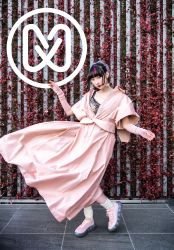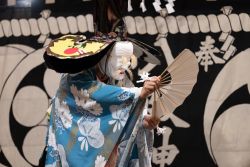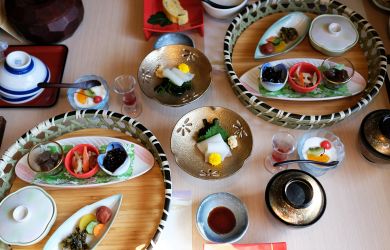
Originally published on metropolis.co.jp on May 2012

You might not guess it now with all the powerful Japanese riot grrrl rock groups about these days, but drummer Masumi Sakurai of Tokyo noise rock duo Moja is something of a pioneer. When she went to famed music college Berklee in Boston, she was the only woman drummer among dozens of Japanese.
“In the past, there wasn’t as much of an underground and a higher level of performance was expected from professional recording artists,” she says at a Shibuya café. “The explosion of the underground has opened up the field to anyone, including women who may have been put off by the image of drums as a man’s instrument. People feel freer to express themselves even if they’re not experts.”
“Women are stronger in general, and Japanese women musicians are popular overseas,” shaggy bassist/vocalist Haru Higuchi chips in, pointing to tours by women-led indie rock bands like Bo-Peep and Detroit7. “Men don’t want to go abroad anymore,” he says.
Created in 2005 when their previous band Gorilla disintegrated leaving only Masumi and Haru, Moja have—beneath the radar of Japan’s conservative mainstream music industry—become one of the country’s more popular musical exports.
When Metropolis meets them they’ve just returned from their fourth tour of England. A quick junket to South Korea is to follow. “This tour was really good,” Haru says with an audible sense of contentment. “We rented a car and toured Wales and England, not just London. It was the first time we were really able to mix it up with local bands.”
“We got to experience the underground scene and get a sense of what is going on there at the moment,” Masumi adds. “Experiencing different ways of thinking prevents us from becoming set in our ways. Going abroad frequently keeps our music from going stale.”
To play and tour in such intimate circumstances, Haru and Masumi must be a couple, right? “If we were involved it would be difficult for us to get along as musicians,” Haru says, giving a practiced response. “We both have strong personalities and butt heads as a band—if we were a couple it would intrude onto our personal life. Since we’re not involved we can leave it at the studio.”
Listening to their new album Super Ultra Gold 79, you get the sense that all the stress that builds up in their busy Tokyo lives gets released in their music. From the chaotic opener “Introduction” through to the foreboding, machine-gun drum riffs of the closer “100 °C,” the album is a maelstrom of start-stop rhythms and scorching blasts of guitar, bass, synths and screamy vocals.
“More than the lyrics, the sound itself is the main point,” Masumi says, her well-coiffed appearance and mild manner belying Moja’s wild, visceral music. “That’s why we like to set up our instruments on the floor—so our audience can feel the vibrations in their guts.”
For Super Ultra Gold 79 Moja (the name has no particular significance they say) took the unusual strategy of issuing the album in mp3 and vinyl forms, but without a CD release.
“The mp3s are for the bulk of people who don’t have turntables,” explains Haru. “People don’t buy CDs anymore, and we want as many people as possible to hear our music, hence the free downloads. The vinyl is because we love analog. If people take different approaches to releasing music it will hopefully stimulate the imagination of buyers, and the market.”
Moja’s unorthodox approach to music seems to reflect a general nonconformist approach to life. And death. In his day job, Haru arranges flowers for funerals.
“I see death every day, so I understand the finality of life,” he concludes. “When people die they become simply material objects, so that gives me an appreciation of life. It makes me feel like I could die anytime so I want to do all I can while I’m alive. I don’t want to leave any regrets.”
Moja play Metropolis’ next Saiko live music showcase. Shibuya Milkyway, Jun 24 (more info).







